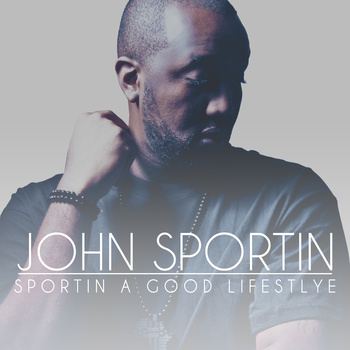One of the biggest flaws often present in hip-hop albums from aspiring emcees is monotony. Many “up-and-coming” rappers simply do not have enough variety in their lyrics or instrumentals, sometimes to the point where it be can be difficult to distinguish certain tracks from one another, and the result is a one-dimensional album that gives the listener little reason to slog through every track. On the flip side, though, there are other albums which have no direction whatsoever, as the emcee fails to establish his niche and attempts, usually poorly, to fit in with a number of different styles. Both one of these shortcomings can severely hamper an album’s replay value, and unfortunately, “Sportin a Good Lifestyle” falls prey to both. Aside from boasting of his prowess on the mic and his abilities as an emcee, John Sportin’s lyrics rarely venture outside the typical materialistic topics such as women and money. While there are a handful of quality instrumentals, the production wavers between hardcore, gangster-rap tracks and softer, more R&B-influenced cuts, and it seems as if John Sportin is unable to decide which subgenre best showcases his lyricism.
I’ll admit, after the intro track, arguably the most polished instrumental on the album, I had high hopes for “Sportin a Good Lifestyle.” Complete with sweeping orchestral strings, jazzy trumpets, and flowing grand piano keys atop a soft drum loop, “Introduction” has a uplifting vibe that is impossible to ignore. John Sportin gives the listener a look inside his past, as he discusses his life growing up in the hood and his friends who never made it, and he positions himself as one of the few lucky individuals to escape the streets, rapping “Your boy never sold drugs, I’m smarter than that.” My expectations for the rest of the album, though, were soon tempered after hearing the next couple tracks, which fail to capture any of the soulful flavor present in “Introduction.” “Warning Shot” is nothing more than your average gangster-rap song and sounds like it could have been made in a few hours on FL Studio. “King of the City” has a similar feel, and while the track is certainly a head-banger, with a deep bassline and a heavy drum kit, the snyth-driven beat does little to make up for Sportin’s lackluster rhymes.
With no idea of what to expect next, I found that the next two songs reverted back to the more sample-driven feel of the opening track. On “Pay-Per,” over triumphant horns and a vocal sample from Biggie’s “Dead Wrong” on the chorus (“I just want the paper, I just want the paper”), Sportin discusses his continual lust for money despite knowing that it’s “the root of all evil,” as he spits “My mind playing tricks on me, Willie D/I can’t sleep because this paper keeps calling me.” Despite his extremely materialistic mindset, the track is saved by his confident delivery and his lyrics that anyone looking to make a dollar can relate to. And on “Like a Dream,” a posse cut featuring J-Coop and Abib Jahleel, the crooning vocal sample and upbeat piano keys provide a smooth backdrop for each emcee’s rhymes, making for one of the album’s most enjoyable tracks.
After these early highlights, though, the album takes a turn for the worst and begins to spiral downhill. Sportin shows off his romantic side on the next couple tracks, “Love No More” and “On Replay,” the latter of which borrows the chorus from Sean Kingston’s wildly popular hit single “Replay,” and the result is somewhat of a mixed bag. The beats are admittedly catchy, but Sportin’s switch to a more R&B vibe does not complement his delivery particularly well, and his rather unoriginal lyrics stand out even more atop the sparser, slowed-down production. The album’s low point, though, comes several tracks later, after the unremarkable “Who You With,” which features a catchy drum loop and a Jay-Z vocal sample on the chorus but is ruined by a persistent stabbing synth. “The Dopest” is the epitome of poorly-produced gangster-rap song, with nothing more than a high pitched synth, a thumping bassline, and an unauthentic sounding drum kit laying the foundation, and it only gets worse with Sportin’s lyrics, as he raps:
“Ain’t no mistaken me
Tall like the ballers be
Ball like the ballers be
Suckas can’t relate to me
Flow like the greats be
You know, Hov, Big, Nas, Pac
Niggas can’t stop me”
The fact that Sportin felt it was appropriate to compare himself with some of the greatest emcees of all time is mind-boggling, given his overall lack of lyricism on the track, and the few remaining songs on the album provide no evidence to support his claim. Thus, what starts off as a promising album from the underground emcee hailing from Brooklyn deteriorates into a strange mix of hardcore gangster-rap and hip-hop/R&B ballads, and John Sportin is probably best suited for neither of these subgenres. The few tracks that really stand out, such as “Introduction” and “Like A Dream,” have a less mainstream and more authentic feel that is simply not present throughout the rest of the album, and aside from these few highlights, listeners are likely to find that “Sportin a Good Lifestyle” has limited replay value overall. Maybe once Sportin is able to decide on a consistent style and deliver a more focused album, my opinion of his ability as an emcee will change, but until then he remains largely unimpressive.

